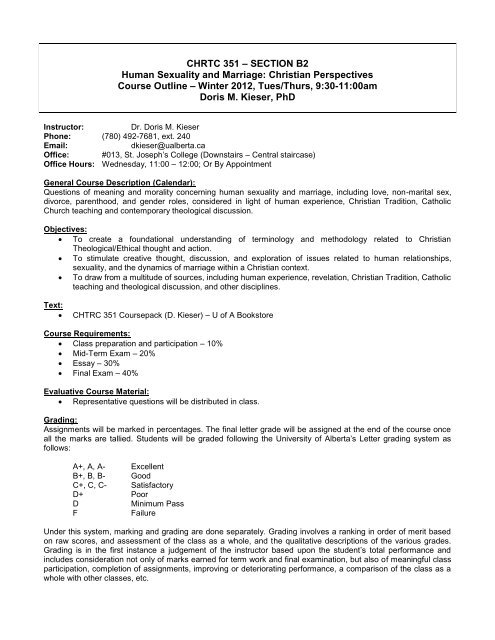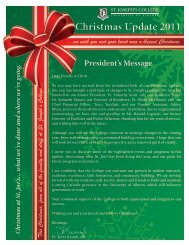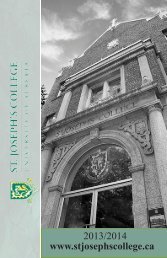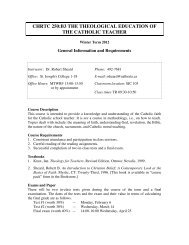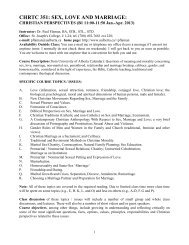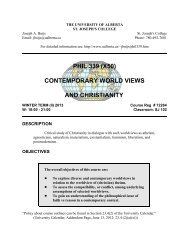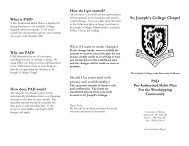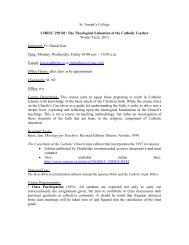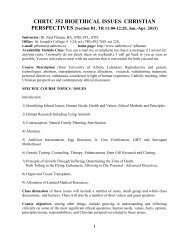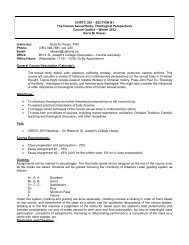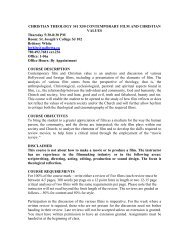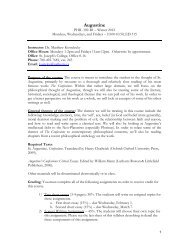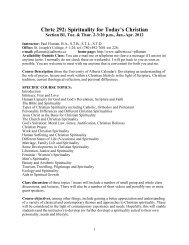CHRTC 351 - St. Joseph's College - University of Alberta
CHRTC 351 - St. Joseph's College - University of Alberta
CHRTC 351 - St. Joseph's College - University of Alberta
- No tags were found...
Create successful ePaper yourself
Turn your PDF publications into a flip-book with our unique Google optimized e-Paper software.
<strong>CHRTC</strong> <strong>351</strong> – SECTION B2Human Sexuality and Marriage: Christian PerspectivesCourse Outline – Winter 2012, Tues/Thurs, 9:30-11:00amDoris M. Kieser, PhDInstructor:Dr. Doris M. KieserPhone: (780) 492-7681, ext. 240Email:dkieser@ualberta.caOffice: #013, <strong>St</strong>. Joseph‟s <strong>College</strong> (Downstairs – Central staircase)Office Hours: Wednesday, 11:00 – 12:00; Or By AppointmentGeneral Course Description (Calendar):Questions <strong>of</strong> meaning and morality concerning human sexuality and marriage, including love, non-marital sex,divorce, parenthood, and gender roles, considered in light <strong>of</strong> human experience, Christian Tradition, CatholicChurch teaching and contemporary theological discussion.Objectives: To create a foundational understanding <strong>of</strong> terminology and methodology related to ChristianTheological/Ethical thought and action. To stimulate creative thought, discussion, and exploration <strong>of</strong> issues related to human relationships,sexuality, and the dynamics <strong>of</strong> marriage within a Christian context. To draw from a multitude <strong>of</strong> sources, including human experience, revelation, Christian Tradition, Catholicteaching and theological discussion, and other disciplines.Text:CHTRC <strong>351</strong> Coursepack (D. Kieser) – U <strong>of</strong> A BookstoreCourse Requirements: Class preparation and participation – 10% Mid-Term Exam – 20% Essay – 30% Final Exam – 40%Evaluative Course Material: Representative questions will be distributed in class.Grading:Assignments will be marked in percentages. The final letter grade will be assigned at the end <strong>of</strong> the course onceall the marks are tallied. <strong>St</strong>udents will be graded following the <strong>University</strong> <strong>of</strong> <strong>Alberta</strong>‟s Letter grading system asfollows:A+, A, A- ExcellentB+, B, B- GoodC+, C, C- SatisfactoryD+ PoorDMinimum PassFFailureUnder this system, marking and grading are done separately. Grading involves a ranking in order <strong>of</strong> merit basedon raw scores, and assessment <strong>of</strong> the class as a whole, and the qualitative descriptions <strong>of</strong> the various grades.Grading is in the first instance a judgement <strong>of</strong> the instructor based upon the student‟s total performance andincludes consideration not only <strong>of</strong> marks earned for term work and final examination, but also <strong>of</strong> meaningful classparticipation, completion <strong>of</strong> assignments, improving or deteriorating performance, a comparison <strong>of</strong> the class as awhole with other classes, etc.
Plagiarism and Cheating:2<strong>University</strong> <strong>of</strong> <strong>Alberta</strong> Calendar (Appendix „A”, Code <strong>of</strong> <strong>St</strong>udent Behaviour; online:www.u<strong>of</strong>aweb.ualberta.ca/gfcpolicymanual/content.cfm?ID_page=37633 ):Section 30.3.2 – Inappropriate Academic Behaviour:Section 30.3.2 (1) Plagiarism:No <strong>St</strong>udent shall submit the words, ideas, images or data <strong>of</strong> another person as the <strong>St</strong>udent‟s own in any academicwriting, essay, thesis, project, assignment, presentation or poster in a course or program <strong>of</strong> study.Section 30.3.2(2) Cheating:(a) No <strong>St</strong>udent shall in the course <strong>of</strong> an examination or other similar activity, obtain or attempt to obtain information fromanother <strong>St</strong>udent or other unauthorized source, give or attempt to give information to another <strong>St</strong>udent, or use, attemptto use or possess for the purposes <strong>of</strong> use any unauthorized material.(b) No <strong>St</strong>udent shall represent or attempt to represent him or herself as another or have or attempt to have himself orherself represented by another in the taking <strong>of</strong> an examination, preparation <strong>of</strong> a paper or other similar activity. Seealso misrepresentation in 30.3.6(4).(c) No <strong>St</strong>udent shall represent another‟s substantial editorial or compositional assistance on an assignment as the<strong>St</strong>udent‟s own work.(d) No <strong>St</strong>udent shall submit in any course or program <strong>of</strong> study, without the written approval <strong>of</strong> the course Instructor, all ora substantial portion <strong>of</strong> any academic writing, essay, thesis, research report, project, assignment, presentation orposter for which credit has previously been obtained by the <strong>St</strong>udent or which has been or is being submitted by the<strong>St</strong>udent in another course or program <strong>of</strong> study in the <strong>University</strong> or elsewhere.(e) No <strong>St</strong>udent shall submit in any course or program <strong>of</strong> study any academic writing, essay, thesis, report, project,assignment, presentation or poster containing a statement <strong>of</strong> fact known by the <strong>St</strong>udent to be false or a reference to asource the <strong>St</strong>udent knows to contain fabricated claims (unless acknowledged by the <strong>St</strong>udent), or a fabricatedreference to a source.Section 30.3.2 (3) Misuse <strong>of</strong> Confidential Materials:No student shall procure, distribute, or receive any confidential academic material such as pending examinations,laboratory results, or the content there<strong>of</strong> from any source without prior and express consent <strong>of</strong> the Instructor.Required Notes: Policy about course outlines can be found in 23.4(2) <strong>of</strong> the <strong>University</strong> Calendar (GFC 29 SEP 2003). The <strong>University</strong> <strong>of</strong> <strong>Alberta</strong> is committed to the highest standards <strong>of</strong> academic integrity and honesty. <strong>St</strong>udents areexpected to be familiar with these standards regarding academic honesty and to uphold the policies <strong>of</strong> the <strong>University</strong>in this respect. <strong>St</strong>udents are particularly urged to familiarize themselves with the provisions <strong>of</strong> the Code <strong>of</strong> <strong>St</strong>udentBehaviour (online at www.ualberta.ca/secretariat/appeals.htm) and avoid any behaviour which could potentially resultin suspicions <strong>of</strong> cheating, plagiarism, misrepresentation <strong>of</strong> facts and/or participation in an <strong>of</strong>fence. Academicdishonesty is a serious <strong>of</strong>fence and can result in suspension or expulsion from the <strong>University</strong> (GFC 29 SEP 2003).Course Outline:I. Preliminaries:An introduction to the foundational terminology and methodology related to Christian theological/ethicalthought and action. Some example topics are: revelation, faith, belief, decision-making, conscienceformation, Vatican II, spirituality, church, laity, method in theology, sources <strong>of</strong> theology, feminism,historical worldview, classicist worldview, pluralism, ecumenism, inclusive language, hermeneutic <strong>of</strong>suspicion.II. Human Development and Human Relationships:An exploration <strong>of</strong> issues and questions related to healthy human development and human relationships.Some example topics are: self-esteem, men‟s and women‟s roles, authenticity, fidelity, humanexperience, physical contact, maturity, compassion, grace, love, dualisms, fruitfulness, friendship,passions, development and growth.III. Human Sexuality and Sexual Expression:A more specific look at factors involved in human sexuality and sexual expression. Some example topicsare: sexual revolution, feminist movement, ambiguity and ambivalence, sacramentality, abuse, violence,sexual orientation, masturbation, chastity and celibacy, birth control, sexuality as gift, right relation, andembodiment.IV. Christian Marriage:
A closer consideration <strong>of</strong> the dynamics <strong>of</strong> Christian marriage in the light <strong>of</strong> the previous material. Someexample topics are: sex in marriage, mutuality, marriage as journey, marriage as sacrament,communication, permanence, divorce, annulment, remarriage, personal growth, extra/non-marital sex,children, family, being single, commitment.Resources: <strong>St</strong>. Joseph‟s <strong>College</strong> Library (a U <strong>of</strong> A library) – downstairs in the <strong>College</strong>, accessible from the eastentrance to the building (facing the Education building). All NEOS libraries.Course Requirements:1. Mid-Term Exam: 20% - Tuesday, February 142. Major Essay: 30% - Tuesday, March 20 by the end <strong>of</strong> class. Late papers will be docked 5% per day late. Nopapers will be accepted after Tuesday, March 27. Your essay will integrate theological/ethical reflection on themes/topics covered in the course withan analysis <strong>of</strong> one <strong>of</strong> the films listed below. The use <strong>of</strong> the films is to engage popular culture withthe themes touched upon in the course. Films that are not on the list are unacceptable foruse in your essay. See list <strong>of</strong> films available from which to choose3. Final Exam: 40% - Friday, April 20, 9:00am (Deferral Exam Date: Monday, May 14, 9:00am)4. Class Participation:10% - This requirement is based upon class attendance, significant and relevant contribution todiscussion (including one-minute feedback), familiarity with readings, general attitude andperformance in class. This mark is assigned at my own discretion.Note: If you have any questions, queries, or problems related to the course, I am happy to meet with you eitherduring my <strong>of</strong>fice hours, or at another time mutually convenient to us.3<strong>CHRTC</strong> <strong>351</strong> (Winter 2012) – Reading Assignments____________________________________________________Week 1: January 10, 12 - Introduction Margaret Farley - “Sexual Ethics”____________________________________________________Week 2: January 17,19 - Moral Theology in Historical Context Richard Gula - “Moral Norms and Moral Theology” and “The New Context forMoral Norms”___________________________________________________________Week 3: January 24, 26 - Spirituality and Action; Human Development Evelyn Eaton Whitehead and James D. Whitehead – “Change in Adult Life: PsychologicalPatterns and Religious Themes” Joan Chittister – “Spirituality for the Long Haul”____________________________________________________________Week 4: January 31, February 2 - Anthropology and GenderRegina A. Coll – “What it Means to be Human”Margaret A. Farley – “Whether Gender Matters”
____________________________________________________________4Week 5: February 7, 9 - Women and Men Together; Sexuality Whiteheads – “Women and Men: What Differences Do Our Differences Make?” Lisa Cahill – “Sexuality and Christian Ethics: How to Proceed”____________________________________________________________Week 6: February 14, 16 - ***Mid-Term Exam***; Embodiment February 14 - *** Mid-term Exam *** Margaret A. Farley – “Sexuality and Its Meanings: How the Body Matters”____________________________________________________________Week 7: February 20-24 – Reading Week – No Classes______________________________________________________Week 8: February 28, March 1 - Sexuality Pope Paul VI – “Humanae Vitae” Whiteheads – “The Good News About Sex”____________________________________________________________________________________________________________Week 9: March 6, 8 - Sexual Orientation Sacred Congregation for the Doctrine <strong>of</strong> the Faith – “Letter to Bishops…” James B. Nelson – “Sources for Body Theology: Homosexuality as a Test Case”_____________________________________________________________Week 10: March 13, 15 - Abuse, Violence, Power Karen Lebacqz – “Love Your Enemy” Susan Brooks Thistlethwaite – “Every 2 Minutes: Battered Women and Feminist Interpretation” Marvin M. Ellison – “Refusing to be „Good Soldiers‟: An Agenda for Men”_____________________________________________________________Week 11: March 20, 22 - Being Single *** Papers Due, Tuesday March 20 *** Catechism – “The Vocation to Chastity” Karen Lebacqz – “Appropriate Vulnerability”____________________________________________________________Week 12: March 27, 29 - Marriage Catechism <strong>of</strong> the Catholic Church – “Sacrament <strong>of</strong> Matrimony” Whiteheads – “The Meaning <strong>of</strong> Marriage”____________________________________________________________Week 13: April 3, 5 - Marriage & DivorceBernard Cooke – “Christian Marriage: Basic Sacrament” and “What God Has Joined Together…”
__________________________________________________________5Week 14: April 10, 12 – Review & Exam Preparation Review and Final Exam Preparation__________________________________________________________*** Final Exam: Friday, April 20, 2012, 9:00am ***_________________________________________________________Essay Assignment - <strong>CHRTC</strong> <strong>351</strong>Doris M. Kieser, PhD<strong>St</strong>. Joseph’s <strong>College</strong>Your essay will integrate theological/ethical reflection (i.e., academic resources from outside <strong>of</strong> the course) onthemes/topics related to the course with one <strong>of</strong> the films on the list provided. The use <strong>of</strong> the film is to engagepopular culture with the themes touched upon in the course. The focus <strong>of</strong> your essay is, therefore, to be thetopic/themes relevant to the course, not simply a summary and critique <strong>of</strong> the film. Films that are not on thelist are unacceptable for use in your essay.Choose a film in which your theme/topic is addressed (e.g., commitment, healing through sexualengagement, marriage as sacrament, etc.). You may choose to explore the same theme(s) in two (no more)different films (i.e., compare and contrast), OR to explore a number <strong>of</strong> themes in one film, OR one theme, indepth, in one film. The themes suggested on the film list are only to facilitate your choice <strong>of</strong> films. You oughtnot to address all <strong>of</strong> the suggested themes in your essay.Your essay will not exceed 10 pages. You will write in an acceptable academic format. Your essay will betyped (in a standard academic font, e.g., Times New Roman, 12 point font) and double-spaced with standardmargins. The following qualities should be demonstrated in your essay:ooooooAbility to identify significant issues;Familiarity with relevant literature and established views;Appropriate research and references (at least 6 different sources; it is acceptable to use coursematerial, it cannot, however, comprise more than 25% <strong>of</strong> your bibliography; any use <strong>of</strong> internetsources should be with great discretion and proven credibility);Scholarly integrity and fair representation <strong>of</strong> your sources;Organization, clarity, and readability;Good grammar and inclusive language.Recommendations:o View at least 3 different films from the list prior to choosing your theme(s) and movie(s);o Do your research early;o Do not leave your writing to the last minute.
6Essay Writing Tips and GuidelinesDoris M. Kieser<strong>St</strong>. Joseph’s <strong>College</strong>1. Do not plagiarize:a. Use quotation marks and give references for your sources.2. Choose an acceptable academic format/style consistently throughout your paper. Common styles that have referenceguides in every reference section <strong>of</strong> every library on campus, and online at the U <strong>of</strong> A libraries website:a. APA – a common style for science, nursing, etc.;b. MLA – a common style in the social sciences;c. Turabian, Chicago – common styles in the humanities and liberal arts.3. Hand in a clean, original copy <strong>of</strong> your paper.4. Use page numbers.5. Include a title page.6. Do not use contractions.7. Remember this is an Academic paper:a. Personal reflection does not make this simply an opinion piece;b. The use <strong>of</strong> appropriate and authoritative sources is expected;c. Librarians are your friends. They will help you to find appropriate materials.8. Acknowledge yourself, particularly in your personal reflection:a. Acceptable to use “I” statements;b. Acceptable to include personal anecdotes and thoughts.9. Be clear and concise. Ways to do this include:a. Include a thesis statement and overview <strong>of</strong> your paper in your introduction;b. Break your ideas into digestible chunks, i.e., short paragraphs are easier to read than long ones;c. Use subtitles to facilitate comprehension;d. Pro<strong>of</strong> read for errors;e. Use words, phrases and terminology that you understand and that are comprehensible to the reader;f. Use a dictionary. Do not use a thesaurus without a dictionary;g. Use a writer‟s guide (I like <strong>St</strong>runk and White‟s The Elements <strong>of</strong> <strong>St</strong>yle, Oxford‟s Canadian A-Z <strong>of</strong> Grammar,Spelling, & Punctuation, and Oxford‟s Concise Canadian Writer’s Handbook).10. Argue your position (if you choose to take a position), but recognize the limitations <strong>of</strong> your arguments:a. Use appropriate data to substantiate your position;b. Use primary sources to outline not only your own argument but also the arguments <strong>of</strong> those with whom youdisagree;c. Do not make ad hominem (personal) attacks on your detractors.11. In cases <strong>of</strong> extreme frustration, confusion, or downright “I do not know what I am doing”, consult your pr<strong>of</strong>essor, alibrarian, or some other smart person who might give you a bit <strong>of</strong> direction.<strong>CHRTC</strong> <strong>351</strong> – Human Sexuality and Marriage
Doris M. KieserResearch Essay Marking Guide71) Research and Content: Use <strong>of</strong> sufficient and appropriate academic theological (and other) resources; demonstratecomprehension <strong>of</strong> topic and resources; present relevant and up-to-date information accurately, fairly, and withscholarly integrity; research appropriate to essay length; exhibit depth <strong>of</strong> thought; engage resources appropriately;summarize and represent film accurately; address themes appropriate to film chosen._________________/502) Writing Skill: Clear, balanced, well organized, flows well, interesting, consistent style; proper spelling, grammar,punctuation, inclusive language; consistent format, bibliography/reference page, proper referencing, appropriatelength._________________/303) Personal Insights/Reflection: Relevant to topic and sources; depth <strong>of</strong> thought; reach sound conclusions withcoherent reasoning; present a reflection on the project‟s personal and theological/spiritual impact; demonstrate goodanalysis, understanding, and application <strong>of</strong> the material. Please note: use “I” statements in your reflection; this isabout why you have chosen this particular topic and how it affects you._________________/20Total Mark:______________/100


